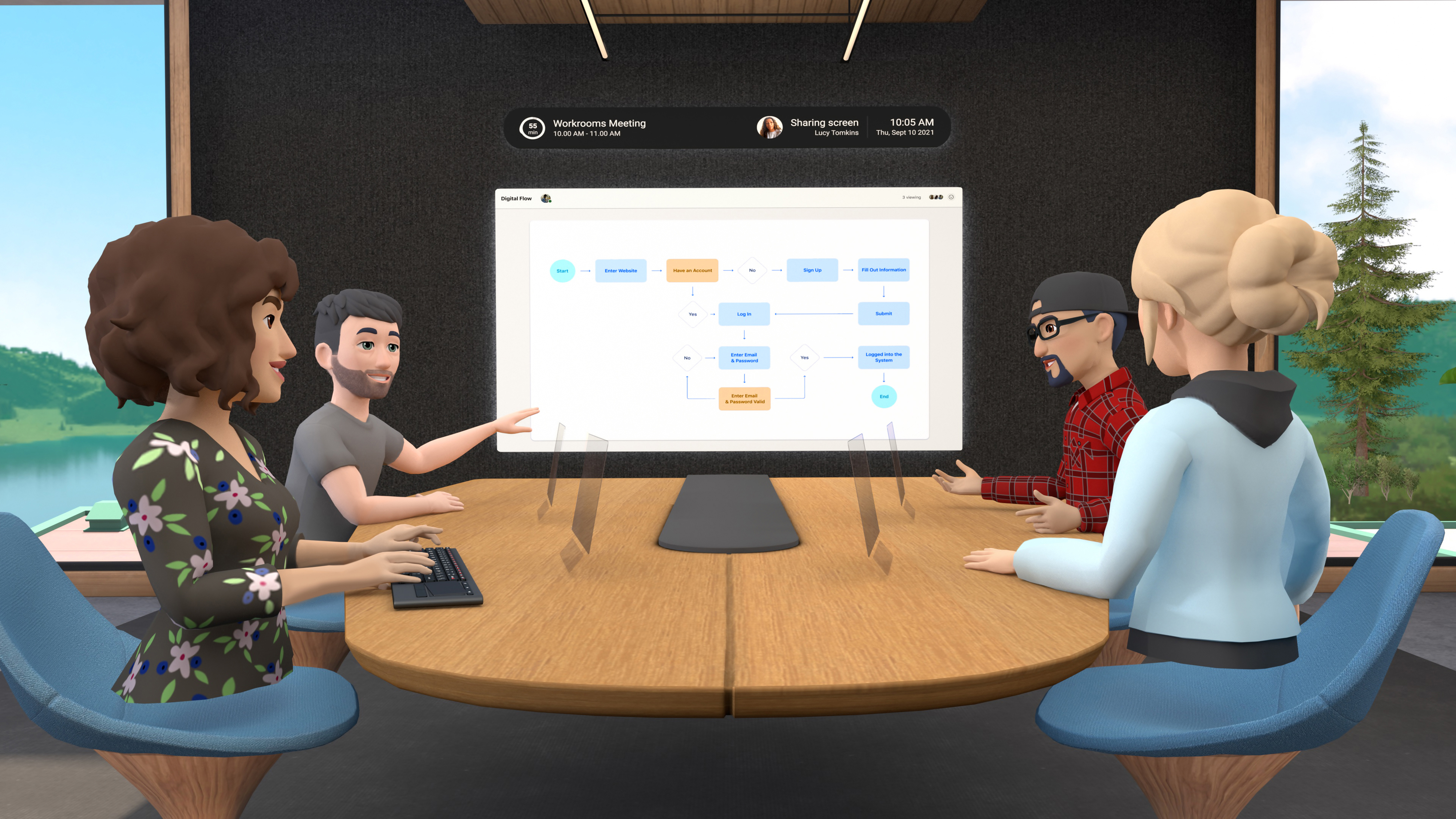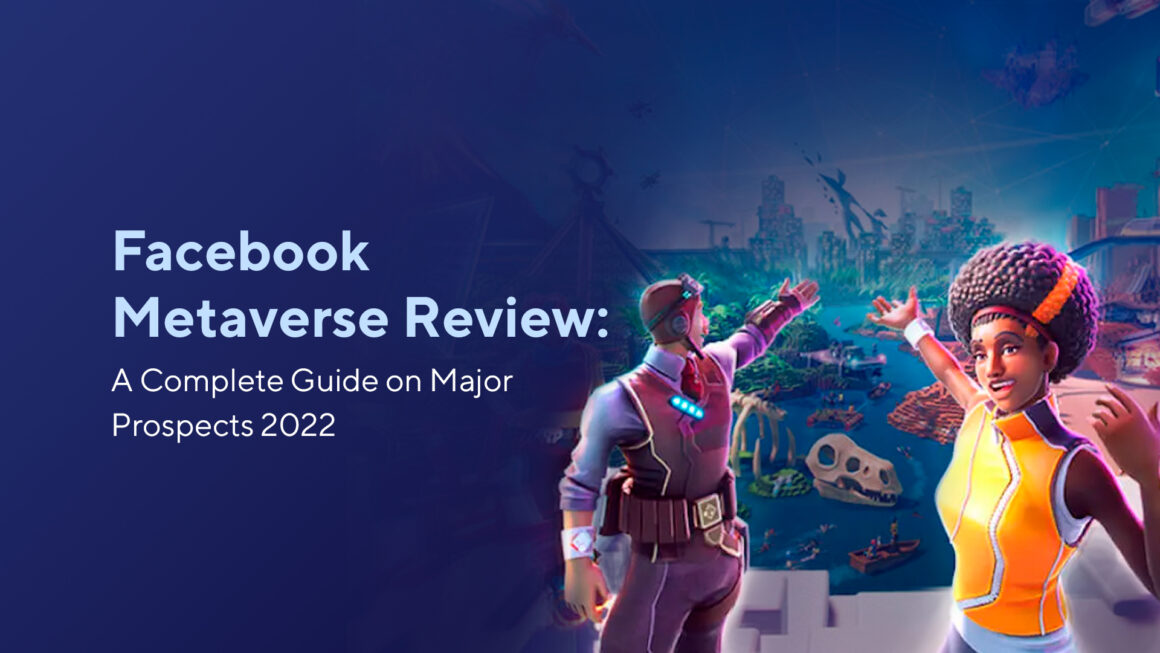Zuckerberg’s metaverse (or Facebook Metaverse) is a future virtual world under development that Meta (formerly Facebook) announced during a rebrand. The developers plan to create an improved social network, where people will be able to communicate, work, study in the same way as now, but in a 3D universe, hiding behind their avatars.
With a high probability, the project will use NFT and DeFi technologies and have its own token providing transactions in the blockchain network. We’ve made a review on the future Facebook Metaverse. As Mark Zuckerberg stated, it may take 5-10 years to develop a full-fledged completed project.
What Is Facebook Metaverse?
The metaverse is a technical and philosophical concept, which implies an organic merging of a person’s real and virtual life. In a speech in October, Zuckerberg explained the concept this way:
We’ll be able to feel present, like we’re right there with people no matter how far apart we actually are. We’ll be able to express ourselves in new, joyful, completely immersive ways, and that’s to unlock a lot of amazing new experiences.
Tech investor Matthew Ball has written a series of essays on the Metaverse. In his opinion, the metaverse is a mechanism in which users’ already exist’, and not to which they ‘address’ to. For example, nowadays, this works this way: you receive a message from a friend, receive a notification, and pick up a device to read the message. In the virtual universe, users are already immersed in a different environment, and this is a fundamentally new concept.
Be that as it may, so far, all the talk about the metaverses is rather hypothetical, and the digital worlds themselves are in their infancy. Still, there are building blocks from which new digital solutions will be created.
Zuckerberg’s Metaverse Idea & Plan
The metaverse will not be one single company. Thus, many organizations and developers will participate in this, but the result should be a joint ecosystem without the currently set technologically or politically restrictions.
Key Principles Followed by Meta:
-
- Accelerating the development of fundamental technologies and tools to run the virtual universe.
-
- Bringing these innovations to social media, improving users’ social experience.
-
- Building a business to support large, long-term investments in better services.
-
- Integrating privacy and security into the metaverse from day one.
-
- Supporting cryptocurrencies and NFT projects, open standards or high compatibility, and new management formats.
At the same time, it is argued that users will enjoy the most loyal conditions — almost all tools will be free, while some will be available at reasonable prices. This will make the digital universe accessible to all categories of users, regardless of their financial situation.
Over the next decade, Meta is scheduled to reach one billion users and become the workspace for millions of developers and content creators.
Why Does Facebook Want to Create a Metaverse?
The main goal of the company is a new direction of investment. The metaverse is seen as the next step in developing the mobile internet and allows you to get ahead of existing competitors.
Apple or Google, which support iOS and Android, outpace Facebook since they have operating systems. Facebook had a number of run-ins with Apple over excessive fees for apps downloaded from the App Store, as well as massive control over developers.
Therefore, the metaverse is something that can help the company gain independence from Apple and Google.
At the same time, some people close to Meta (Facebook) see investing in virtual reality as a diversion from solving the organization’s real problems. Former vice president of partnerships and marketing, Brian Boland, noted that:
It’s a lot more fun to build a metaverse than to answer the tough questions Facebook is facing about issues like political polarization, the spread of misinformation, or teenagers’ mental health.
What Has Already Been Done in This Direction
In December, Mark Zuckerberg gave presentations to content creators in different countries directly via the prototype of the new metaverse. All those present received Oculus Quest 2 points to participate.
It all starts with setting up an avatar. You can customize skin tone, clothing, eyebrows, makeup, and even details like wrinkles. Users then enter a virtual lobby, in this case, a tropical hotel with hanging chairs and a view of Red Rock Canyon.

Then the developers held a trial work meeting using Horizon Workrooms, Meta’s software designed specifically for meetings. This helps to understand the company’s vision in the field of working relations in the virtual world.
Some moments are very realistic. For example, you can turn to the interlocutor, and then their voice will sound louder. It is possible to draw on the board by squeezing your fingers in reality (although this feature is yet to be finalized).

At the same time, there are also disadvantages. The main one is the lack of legs in avatars. This is because the headset cannot pick up foot movements and because it would be too difficult for an Internet connection. After a few hours in the metaverse, people noted more and more problems, including physical ailments — nausea, headaches, the pressure of glasses on the face, increased sweating.
Of course, no one wants to stay in the digital world in this state for a long time. But technology is advancing rapidly, and it’s pretty easy to imagine a world where the hardware is more advanced and the graphics are much more realistic and appealing. Meta works on these and many other aspects.
Main Components of the Future Metaverse
Let’s consider the main elements that will eventually form a full-fledged virtual world Meta:
-
- Virtual Reality. Horizon Workrooms, games with friends.
-
- Augmented Reality. Improving your communication experience with photos and videos. A whole gallery of AR effects from artists both for Facebook and Instagram. Spark AR platform to create your own effects. Collaboration with museums so that users can travel through them online and video paintings in a new 3D format.
-
- Smart glasses. These are wearable technology for interacting with the outside world — for example, Ray-Ban smart glasses designed specifically for Meta. Fine-tuning privacy, notifications, capturing voice commands.
Meta is investing $150 million to build hardware from VR/AR resources to enable developers, content creators, and users to easily access new technologies and features. In addition, the organization follows the principles of ‘responsible innovation’ — this means that the rules of transparency, empowerment, inclusiveness must be fully observed.

Project Prospects & Pitfalls
All this sounds great and exciting and can really make a breakthrough in the digital world. However, not all experts are so optimistic. They highlight several weaknesses that can play a dirty trick on the project. Like any social network, Facebook is full of toxic personalities and trolls. We all at least sometimes face their abusive language and unacceptable behavior. Now imagine that all these personalities are gathered around you in the form of angry avatars shouting something and insulting you.
It would be great to create an environment similar to a park in a large city where people who do not know each other can still get along well with each other. This can be achieved by developing a network of acquaintances and a good reputation.
A lot of controversy arises around issues of privacy and user identification. It is crucial that users themselves choose what information they want to share. Otherwise, Meta will destroy the whole concept of Web 3.0 — that an open metaverse should belong to all users. Evan Greer, an activist with Fight for the Future, said:
It’s easy to see Facebook’s Meta announcement as a cynical attempt to distance itself from all the scandals the company is facing. This is Mark Zuckerberg revealing his end game, which is not just to dominate today’s internet but to control and define the internet that we leave to our children and our children’s children.
Finally, some experts are convinced that this attempt to drag people from the real world to the virtual one is unlikely to succeed — the effectiveness of face-to-face negotiations and physical contact is beyond any doubt.
Conclusion
Since the development of Zuckerberg’s metaverse is still in its infancy, it’s too early to state if it will be the ‘next version of the internet.’ And even if this next version takes place, will the Meta become the dominant player in it?
Nevertheless, this is an important and necessary experiment and the next step towards developing Web 3.0, and a very ambitious one. Zuckerberg is very passionate about the idea and is investing millions of dollars in it, and yet some analysts tend to see this as a whim of a rich man who wants to try something new. Time will tell who was right.
Are you guys looking forward to Facebook Metaverse? Feel free to share your thoughts in the comments below!

Leave a Reply